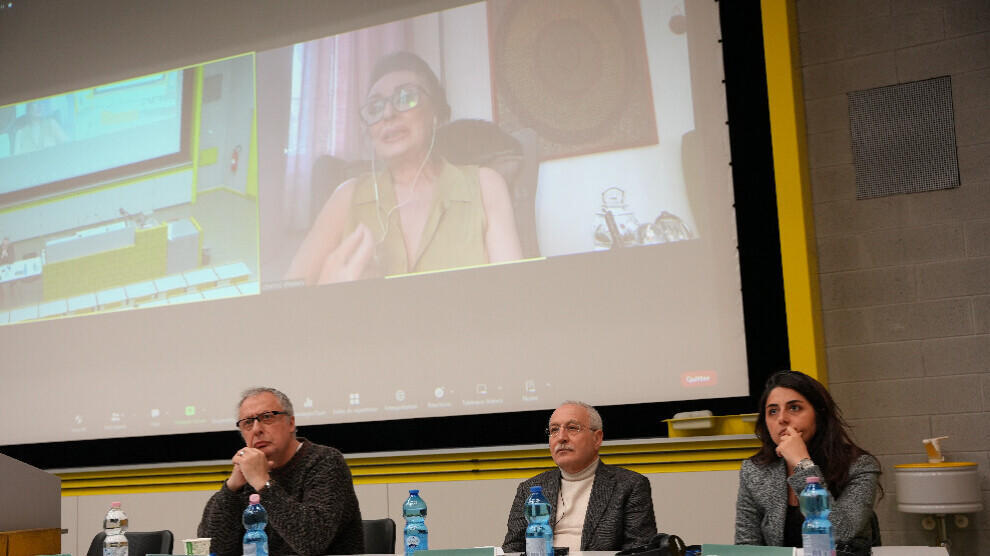Conference in Geneva: There is no law in İmralı
At the Geneva conference on political prisoners, it was emphasized that no law is in effect in İmralı and enemy law is applied to the opponents, especially Kurds, in Turkey.
At the Geneva conference on political prisoners, it was emphasized that no law is in effect in İmralı and enemy law is applied to the opponents, especially Kurds, in Turkey.

A conference titled "Political Prisoners in the World and in Turkey" is taking place in Geneva, Switzerland as part of the "Freedom for Abdullah Öcalan and a political solution to the Kurdish question" campaign that was launched globally on October 10. Experts in their fields are participating in the conference at the Uni Mail campus of the University of Geneva as speakers.
In the second session of the conference, a panel discussion dealth with "History of prisons in Turkey and treatment of political prisoners” and “Current situation in Turkish prisons”. In the panel moderated by Gianfranco Fattorini, Representative of the Movement for the Struggle against Racism and Friendship between Peoples (MRAP) to the UN Office in Geneva, IHD (Human Rights Association) Co-Chair Eren Keskin, ÖHD (Association of Lawyers for Freedom) Prison Commission Member Attorney Zelal Aydoğan and Kurdish politician Kemal Aktaş spoke.
EREN KESKİN: KURDS HAVE ALWAYS BEEN SUBJECTED TO A SPECIAL LAW
IHD Co-Chair Eren Keskin, who attended the conference online due to a ban on traveling abroad, stated that the Turkish state was founded on ignoring the differences in the country and has never abandoned the policy of denial. Eren Keskin said that the Turkish state implements a special law against Kurds in every field and added, "If you say that there is a Kurdish issue in this country, if you say that there is an Armenian genocide in the history of this country, you will always be seen as a criminal in this country."
'NO LAW WORKS IN IMRALI'
Eren Keskin said, "If you want to understand Turkey, you need to look at Turkey's founding ideology" and added, "Today we can say that Erdoğan and Kemalists are in common on many issues."
Noting that an isolation regime has been built in all of Turkey's prisons, Eren Keskin said, "One of the places where this isolation is most intense is İmralı. There has been isolation in İmralı Prison since the beginning. İmralı Prison is managed in violation of Turkey's own domestic law. We still do not know what law governs İmralı. Abdullah Öcalan has always faced a special law from the day he was arrested until today."
ENEMY LAW
Eren Keskin pointed out that all dissidents in Turkey are labeled as terrorists and that this approach has turned into a form of governance in Turkey. Keskin said that no one who is an opponent in Turkey has security of life and added, "Every day we wake up to death threats. In other words, no law is applied to anyone in Turkey who is in opposition, especially Kurds. But there is a law, and it is the enemy law."
ZELAL AYDOĞAN: A REGIME OF ISOLATION HAS BEEN BUILT AROUND IMRALI
Speaking after, ÖHD Prison Commission Member Lawyer Zelal Aydoğan said, "There is so much unlawfulness against political prisoners that we have started to categorize them. The most important of these is isolation. A new system was built in Turkish prisons after Abdullah Öcalan was brought to İmralı. Since then, an isolation regime has been built in prisons against political prisoners in Turkey."
Referring to the situation of sick prisoners in prisons, Aydoğan said that these sick prisoners were not even treated, let alone released. She added, "The issue of sick prisoners is more than a legal one, it is first and foremost a humanitarian and conscientious issue."
AKTAŞ: THERE IS RESISTANCE EXTENDING FROM THE PRISONS OF AMED TO İMRALI
Kurdish politician Kemal Aktaş, who started his speech by drawing attention to the aggravated isolation of Kurdish People's Leader Abdullah Öcalan, said, "Unless the Imrali isolation is understood correctly, none of the problems in prisons in Turkey today can be understood." Referring to the 1980 military coup and the severe problems experienced in prisons in Turkey, especially among Kurds, Aktaş said, "The Turkish state has always implemented its system in prisons first."
Reminding of the inhumane practices in the dungeons of Amed (Diyarbakır), Aktaş said, "In Amed dungeons, there was not only severe torture and inhumane practices. The aim was the denial of a people in the person of the prisoners there. Today, the same inhumane practices and policies are being implemented in İmralı in the person of Leader Öcalan. In Amed prison, we frustrated all the policies of the Turkish state with resistance. Today, the same resistance is put up in Imrali and other prisons."
In the last session of the conference, "Abdullah Öcalan and the Imrali System", "History and paradigm of the captivity of Abdullah Öcalan” and “The Imrali system, Isolation” will be discussed with the participation of Raziye Öztürk from Asrın Law Office, Olivier Peter from Geneva Bar Association and Mahmut Şakar, one of Abdullah Öcalan's lawyers.